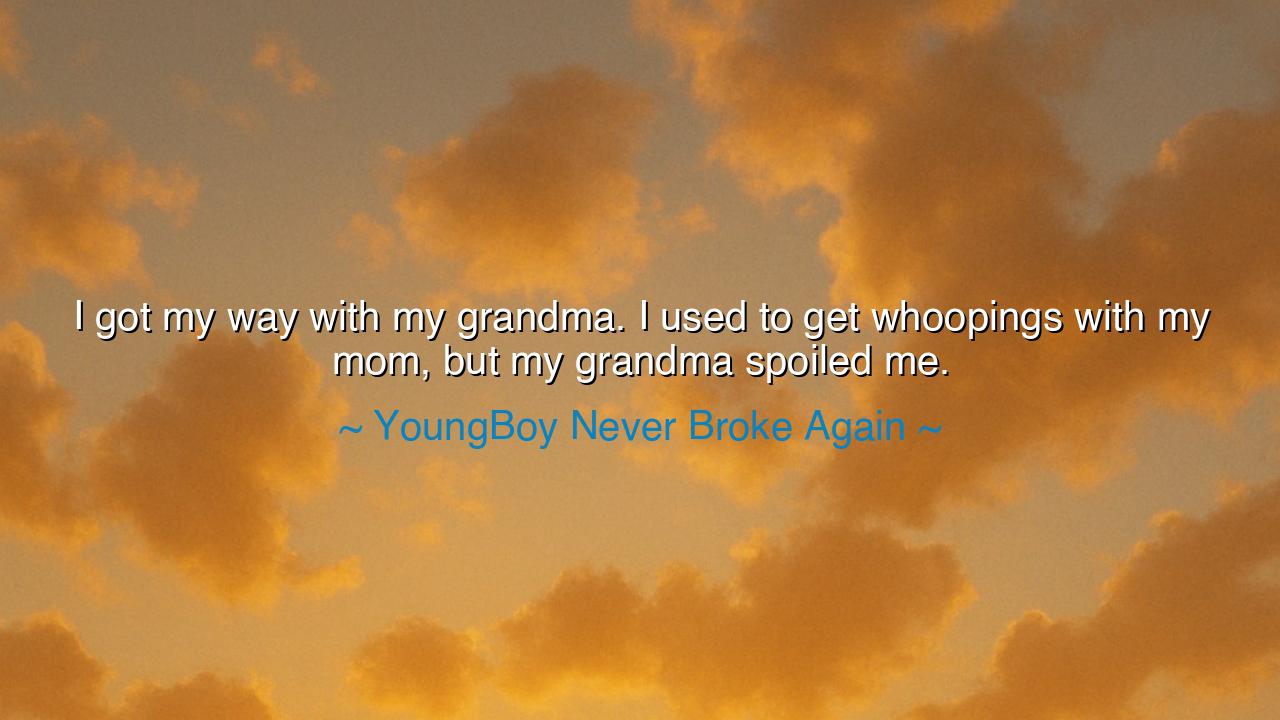
I got my way with my grandma. I used to get whoopings with my
I got my way with my grandma. I used to get whoopings with my mom, but my grandma spoiled me.






The young prophet of the modern streets, YoungBoy Never Broke Again, once spoke with disarming simplicity: “I got my way with my grandma. I used to get whoopings with my mom, but my grandma spoiled me.” To the casual ear, it may sound like a memory of childhood mischief—but beneath its surface lies something far deeper: the eternal contrast between discipline and affection, between the tough love that molds the will and the tender love that softens the heart. In these few words, YoungBoy gives voice to a truth that transcends generations—the truth that love wears many faces, and that each, in its own way, shapes the soul.
The origin of this quote rests in the artist’s own story—a boy raised amid hardship, who found himself suspended between worlds of stern reality and gentle refuge. In his mother’s hands, he met the hard lessons of survival, the kind of love that must teach through consequence. In his grandmother’s arms, he found a sanctuary of unconditional care, a space where his flaws were met not with correction, but with compassion. This balance between the strict and the soft is as ancient as humanity itself; it is the way the universe tempers its children—through both the fire that forges and the water that cools.
In the grandmother’s spoiling, there is not weakness, but wisdom. The elders of old knew that every soul, especially the young and wounded, needs a place to rest—a space free of judgment where the heart can heal and learn to trust. The grandmother has always symbolized the keeper of warmth, the guardian of stories, the healer of wounds both visible and unseen. When YoungBoy says, “I got my way with my grandma,” he is not boasting of indulgence; he is acknowledging the soft power of mercy—that gentle force which reminds the child that, despite the world’s harshness, love can still be kind.
Yet this tale is not without its shadow. For indulgence alone cannot raise a warrior. The whoopings from his mother, painful as they were, held their own sacred purpose. They were the boundaries that taught consequence, the anchor against chaos. The mother’s love, though fierce, was rooted in survival—it carried the burden of responsibility, of shaping her child into someone who could endure the world’s trials. In this balance of correction and compassion, we find the duality of life itself. Just as the sun burns and the moon soothes, so too must love sometimes wound in order to protect.
History has long echoed this dance between sternness and softness. Consider Alexander the Great, whose father, King Philip of Macedon, trained him in the discipline of war, while his mother, Olympias, nurtured his spirit with pride and mysticism. The father’s discipline gave him strength; the mother’s love gave him purpose. Without one or the other, he might have been either untempered or unmotivated. So it is with every human soul: we are shaped by the hands that discipline us and healed by the arms that hold us. Both are forms of love, though they speak in different tongues.
The lesson in YoungBoy’s words, though humble, is profound: every person must learn to honor both sides of love—the love that corrects and the love that comforts. Do not despise discipline, for it builds your backbone; do not reject tenderness, for it nourishes your heart. If you were blessed with someone who was gentle when the world was cruel, cherish them. And if you had someone who was strict when you needed guidance, thank them. For one gave you wings, and the other, roots.
In your own life, strive to embody both. Be firm with yourself when weakness tempts you, but also gentle when you falter. With others, learn when to correct and when to comfort. The true sage, like the true parent, knows that strength and mercy must walk hand in hand.
Thus, remember the quiet wisdom in YoungBoy Never Broke Again’s words: “I got my way with my grandma… but my mom whooped me.” In this simple confession lies the whole story of the human heart—its need for structure, its hunger for softness, its journey through the opposing forces that make it whole. For love that only disciplines grows cold, and love that only spoils grows weak. But love that knows when to burn and when to bless—this is the love that shapes destinies.






AAdministratorAdministrator
Welcome, honored guests. Please leave a comment, we will respond soon